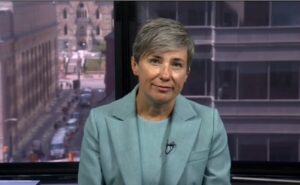
The volume of Ukraine’s gross external debt increased by $8.8bn during the second quarter of this year and amounted to $148.6bn at the end of the half-year, according to the website of the National Bank of Ukraine (NBU).
“Relative to GDP, the debt increased from 90.5% to 92.7%,” the National Bank noted.
At the same time, the external debt of the public sector for the second quarter of 2023 increased by $8.4 billion to – $84.5 billion (52.7% of GDP), while the debt of the private sector – by $0.4 billion to $64.1 billion (40% of GDP).
As indicated by the National Bank, the growth in the public sector was due to net attraction of $8.8 billion in loans from international partners, including $3.6 billion from the International Monetary Fund (IMF), while the government debt on securities decreased by $0.12 billion.
According to the central bank, the volume of external liabilities of Ukrainian banks decreased by $0.08bn to $1.8bn (1.1% of GDP), mainly due to the reduction of debt on loans by a similar amount.
External debt of other sectors of the economy increased by $0.2bn to $41.3bn (25.8% of GDP). As explained by the regulator, this was due to the growth of external debt on guaranteed loans – by $0.14 billion and securities – by $0.05 billion.
Debt of other sectors of the economy, including intercompany debt, increased by $0.52 billion to $62.3 billion (38.9% of GDP) in the reporting quarter.
Direct intercompany debt of enterprises in direct investment relations increased by $0.28 billion to $21 billion (13.1% of GDP) in the quarter due to the increase in external debt on credits and loans of direct investors by $0.26 billion.
The NBU estimated the increase in private sector debt due to exchange rate changes at $0.4 bln.
The volume of overdue debt of the real sector on non-guaranteed loans (including from direct investors) increased by $0.13bn in April-June and amounted to $25.4bn (15.9% of GDP) at the end of the second quarter. According to the NBU, the share of Cyprus in it is 58.1%. In addition, the shares of the UK increased by 1 percentage point (p.p.), to 9.2%, and the Netherlands – by 3 p.p., to 5.8%.
According to the National Bank, Cyprus at the end of the second quarter remained the main creditor country in terms of the geographical structure of private sector debt on non-guaranteed loans (together with intercompany debt) – 49.2% of the total volume, its share since the beginning of the year increased by 0.4 p.p.
The shares of the Netherlands, Germany and Switzerland increased by 0.1 pp. to 7.3%, 3.0% and 2.6% respectively, while the share of the USA remained at 3.0% and the shares of the UK and Luxembourg decreased by 0.1 pp. – to 10.7%.
The main currency of Ukraine’s external borrowings at the end of Q2 2023 remains the US dollar – 50% of total external debt, but its share decreased by 3 p.p. over the quarter. At the same time, the share of borrowings in euros increased from 31.9% to 33.8%, as well as in SDRs to the IMF – from 9.9% to 11.4%, while the share of external debt in hryvnia decreased by 0.2 p.p. to 1.6%. – to 1.6%.
The volume of short-term external debt by residual maturity for the second quarter of 2023 increased by $1.2 billion and amounted to $40.8 billion as of June 30, 2023.
Meanwhile, general government liabilities that require repayment over the next 12 months increased by $0.9 billion to $3.8 billion due to higher future government loan repayments, including $0.2 billion to the IMF, while central bank repayments decreased by $0.18 billion to $1.3 billion due to lower IMF repayments.
The volume of short-term liabilities of the banking sector remained almost at the level of the previous quarter and amounted to $1.3 bln.
The total volume of real sector borrowings (together with intercompany debt), which are to be repaid over the next 12 months, increased by $0.5bn and amounted to $34.4bn as of June 30, 2023. The National Bank specified that the growth is due to an increase in the volume of future repayments on debt securities by $0.4bn.
Experts Club research project and Maxim Urakin recently released an analytical video about the economy of Ukraine and the world.
Subscribe to the Experts Club YouTube channel by clicking here – https://www.youtube.com/@ExpertsClub

The macro forecast of the Ministry of Economy, which formed the basis of the draft state budget-2024, assumes a sharp improvement in the security situation from the second half of next year and, as one of the consequences, an acceleration of economic growth to 5% in 2024 and 7-7.5% in 2025-2026.
“Further economic development of Ukraine depends on the duration and active phase of military operations… Thanks to the military successes of Ukrainian defenders and protectors, a significant reduction of security risks is expected from the second half of 2024, which will positively affect the indicators of economic and social development of Ukraine for 2025-2026,” the document says.
According to the forecast, dated mid-June this year, inflation (at the end of the year) will fall to 10.8% next year, to 7% in 2025 and 5.8% in 2026.
Other estimates include unemployment falling from 18.8% this year to 10.8% in 2026.
In the formation of the revenue side is expected to increase revenues from the National Bank in 2025 to 103.9 billion UAH from 17.7 billion UAH in 2024 with a subsequent reduction to 15.4 billion UAH.
As reported, the government on Friday approved the draft state budget-2024 with revenues of UAH 1 trillion 746.3 billion, expenditures of UAH 3 trillion 108.2 billion and a marginal deficit of UAH 1 trillion 593.6 billion.
In relation to the current law on the state budget-2023, it is proposed to increase revenues by 25.6%, expenditures – by 7.6%, and reduce the deficit by 7.3%.
At the same time, this week the government submitted to the Rada a draft law No. 10038 with amendments to the state budget-2023 to increase its expenditures by 328.5 billion hryvnias due to the growth of internal loans by 207.6 billion hryvnias and external loans by 91.2 billion hryvnias.
Compared to it, revenues in the draft state budget-2024 are higher by 23.3%, or by 329.9 billion UAH, while expenditures are lower by 2.5%, or by 84 billion UAH, and the deficit – by 20.7%, or 416.8 billion UAH.
Experts Club Research Project and Maxim Urakin recently released an analytical video on the economy of Ukraine and the world
You can subscribe to the Experts Club YouTube channel by following the link – https://www.youtube.com/@ExpertsClub

The Slovak government has decided to extend the ban on imports of wheat, corn, rapeseed and sunflower seeds from Ukraine until the end of the year, Prime Minister Ludovit Odor has said.
“The European Commission did not extend the import ban on four products from Ukraine, including wheat, after September 15, so the government decided to ban their imports at the national level. And this is until the end of the year and on the same four commodities, i.e. wheat, corn, rapeseed and sunflower seeds. We have to prevent excessive pressure on the Slovak market to remain fair to domestic farmers,” Odor said, according to Aktuality.
According to him, the government’s move is also a reaction to a similar approach by Poland and Hungary. Odor emphasized that the Slovak government will continue to work intensively with the European Commission and European Union member states to find a pan-European and systemic solution while the national import ban on the four products is in place. He stated the government’s readiness to lift the ban in such a case.
The Slovak Ministry of Agriculture and Rural Development added that the decision is related to the protection of the domestic market and is a logical reaction to the practice of neighboring countries that adopt unilateral import bans.
“The ban does not apply to the transportation of goods through our territory, which expresses our solidarity with Ukraine and the placement of its goods on target markets,” the ministry added.

JSC “Ukrzaliznytsia” (UZ) in January-August transported 10.5% less cargo than in the same period last year – 94.9 million tons, deputy director of the department of commercial work of “UZ” Valery Tkachev said at a meeting of the Export Office on Wednesday.
At the same time in August the volume of transportation amounted to 12.3 million tons, which is 13.8% more than in August last year.
Tkachev noted that the said reduction in the volume of cargo transportation for the first eight months of this year was mainly due to a decrease in the volume of their transportation in the export direction: in January-August it decreased by 14.8% compared to the same period last year, to 34.8 million tons.
“The situation with transportation in the export direction is not very good. Last month we transported only 3.3 million tons of cargo in export traffic. The reason is the closure of the “grain corridor” and the introduction of restrictions on the western border regarding the acceptance of grain. Therefore, unfortunately, our export transportation has decreased. The best indicator was in September (2022), when we transported 5.2 million tons in export traffic. But now, due to the decline in grain transportation, we have the current indicators,” Tkachev said during the meeting.
According to him, as a result of the decline in grain cargo exports, there have been changes in the structure of transportation – iron ore has taken the first place.
“The first place in transportation in export traffic is occupied by iron and manganese ore – 42% of the total volume. Grain takes the second position – 27%, in the third place ferrous metals – 11%”, – said the deputy director of the department of commercial work of “UZ”.
Thus, in January-August the volume of ore transportation amounted to 11.49 million tons, which is 38.3% less compared to the same period last year. The volume of ferrous metals transportation in export traffic decreased by 29.7%, to 3.03 million tons, oil increased by 21%, to 826 thousand tons, building materials fell by 47.5%, to 1.036 million tons, cement increased by 37.4%, to 791 thousand tons.
The volume of grain cargo exports in August amounted to 876 thousand tons, which is 8.8% more than in July. Of this volume, 358 thousand tons of corn, 225 thousand tons of wheat, 235 thousand tons of industrial seeds and 58 thousand tons of other seeds were transported. In the direction of sea ports 143 thousand tons were transported, through land border crossings 733 thousand tons, which is 8.8% more than in July.
For eight months, the volume of grain transportation amounted to 14.75 million tons, which is 27.6% more compared to the same period last year. “Since June 29, the work of the Grain Corridor has been completely blocked. Massive strikes carried out by the aggressor in July-August on the Odessa region resulted in damage to the infrastructure of international and Ukrainian traders in Odessa and Danube ports. “In addition, since May 2, the European Commission has banned the supply of wheat, corn, rapeseed and sunflower seeds from Ukraine to five countries – Bulgaria, Hungary, Poland, Romania and Slovakia – until September 15, 2023,” UZ points out.
“It is pleasing that the volume of grain transportation in the direction of western land crossings began to grow. Already up to 500 railcars per day we transfer to the western BCPs. Let me remind you that in the best times we used to transfer 680 wagons per day and transported 1 million tons of grain across the western borders per month. After the restrictions, the volumes fell to 370-400 cars and 0.5 million tons of grain. Now the situation is normalizing,” – said Tkachev.
It is noted that the cargo flow through land crossings at the end of August amounted to 2.83 million tons, or 86% of the total export traffic by rail. Mostly cargoes went through Chop – 684 thousand tons, Uzhgorod – 396 thousand tons, Batievo – 241 thousand tons, Vadul-Siret – 206 thousand tons, Yagodin – 163 thousand tons. Seaports handled 476 thousand tons of cargo in August, or 14% of the total volume transported by UZ.
In “UZ” also specified that following the results of August seaports handled 476 thousand tons of cargoes, or 14% of the total volume of transportation by rail in the export direction. Of this volume, only Izmail ICC processed 433 thousand tons of cargo.

First Deputy Foreign Minister of Ukraine Emine Dzhaparova has accepted copies of credentials from the newly appointed Canadian ambassador to Ukraine, Natalka Tsmotsi.
According to the press service of the Ukrainian Foreign Ministry, Dzhaparova expressed gratitude to Canada for its significant military, economic, humanitarian assistance, sanctions pressure on the Russian Federation, as well as for Canada’s active participation in the implementation of a number of Ukrainian initiatives, in particular, the Peace Formula and the international Crimean Platform.
The Deputy Minister emphasized that the continuation and increase of military support from international partners, in particular Canada, is the key to bringing Ukraine’s victory closer.
In turn, the Ambassador assured of Canada’s determination to continue to support Ukraine in its struggle for freedom, as well as in post-war reconstruction and implementation of reforms.
“The parties discussed a number of issues on the bilateral agenda and further steps to strengthen relations of friendship and special partnership between Ukraine and Canada,” the statement said.

On September 8, PJSC Ukrhazvydobuvannya (Kyiv) announced its intention to enter into a contract with VUSO Insurance Company (Kyiv) for compulsory civil liability insurance of owners of land vehicles (CMTPL).
As reported in the system of electronic public procurement Prozorro, the company’s price offer was the lowest – UAH 1.099 mln against UAH 4.424 mln expected cost.
The tender was also attended by NJSIC ‘Oranta’ – UAH 1,143 mln and IC ‘Universalna’ – UAH 1,309 mln.
IC “VUSO” was founded in 2001. The company owns 50 licenses: 34 – for voluntary and 16 – for compulsory types of insurance. It is represented in all regions of Ukraine. It is a member of the ITSBU and the FSA, a participant of the Agreement on direct settlement of losses and a member of the Nuclear Insurance Pool.